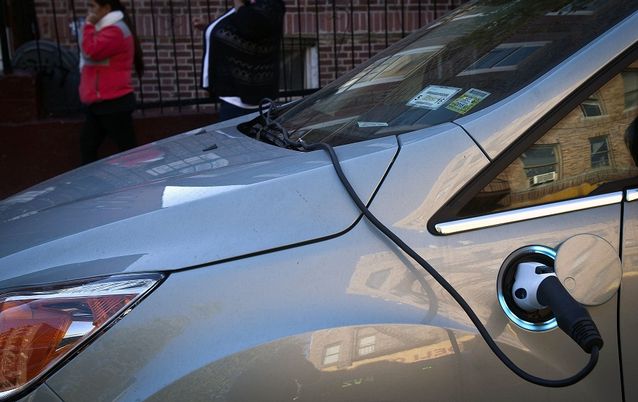Governments must switch on to electric vehicles
by Tim Abbott,
2016-02-16 05:51:10.0
THE automotive sector’s most legitimate response to an increased emphasis on engine technology is an accelerated focus on the electrification of vehicles at scale.
If you follow a simple linear train of thought, it’s only reasonable to accept that the evolution of internal combustion engines will plateau and alternative sustainable solutions will need to evolve to become the new normal.
We have come a long way since the invention of the wheel — humanity’s first foray into personal mobility — but the time has come to transform the sustainability of the automotive sector and its effect on the environment, with specific emphasis on responsible and balanced alternatives.
Our paradigm needs to shift away from the short-term incremental improvement of carbon-based technology towards a road map that promotes and entrenches the transition to electric engines. For this to happen, we need a concerted and collaborative effort to create an environment that supports full electric and plug-in hybrid vehicles, not just as best practice, but as the foundation for the mobility of the future.
An obvious requirement is how we promote (and educate motorists about) electric power as a viable alternative and, in turn, how we evolve our product pipeline to make this a mainstream replacement.
BMW’s efforts at electrification are part of a broad-based sustainability strategy throughout every aspect of our organisation.
From efforts to reduce our own demand on the power grid through the use of renewable energy in production processes, to significant investments in BMW i, we have geared our organisation towards meeting the demands of a shift in mobility patterns and how motoring products are being consumed.
More than this, in SA we have recently launched our Bio2Watt project, which produces 30% of the electricity demand for our plant in Rosslyn from renewable sources.
Current uptake of "pure electric" is about 3%-5%, with ambitious plans to grow this significantly by 2020. We are confident our broad-based efforts are the right solutions to creating an automotive sector with a softer environmental footprint.
Our efforts to reduce the reliance on fossil fuel-based engines (either through fully electric or plug-in hybrid technology) are a significant step in the right direction, but these require a bigger reach if we are to be sustainable as a sector for decades to come.
The challenge is that we need governments to play their part. The electrification of vehicles, and a shift in how mobility thinking is applied, cannot be the job of the automotive sector alone.
What is needed is a policy framework that underpins this as good business, supports the education of consumers and stakeholders and then, more than this, engenders a technical and commercial environment that makes this easy to do for both the automotive sector and its clients.
We need to work together to cross the divide between knowing and doing.
In the short term, it’s about looking at taxation differentials on electric vehicles, but over time it requires a wholesale shift in policy to enable sound thinking to become good practice in action.
This is when we will see the benefit to all and, more importantly, this is when we will see the conversation around sustainability, emissions and environment take on real meaning.
We have reached a tipping point that requires us to respond appropriately and timeously in driving a sustainable agenda. There can be no doubt that electrification is the future of the automobile.
As with all change, this new status quo will not materialise overnight, but incremental gains can and must be made over the next few years.
Every bit helps.
At BMW we welcome this and have already, for some time, been gearing our organisation and our vehicles to meet this agenda.
• Abbott is the of MD of BMW Group SA.

Expanding the use of electric cars, such as this one plugged in on a street in New York, requires buy-in from governments so that a policy framework to shape a new approach to mobility. Picture: REUTERS
THE automotive sector’s most legitimate response to an increased emphasis on engine technology is an accelerated focus on the electrification of vehicles at scale.
If you follow a simple linear train of thought, it’s only reasonable to accept that the evolution of internal combustion engines will plateau and alternative sustainable solutions will need to evolve to become the new normal.
We have come a long way since the invention of the wheel — humanity’s first foray into personal mobility — but the time has come to transform the sustainability of the automotive sector and its effect on the environment, with specific emphasis on responsible and balanced alternatives.
Our paradigm needs to shift away from the short-term incremental improvement of carbon-based technology towards a road map that promotes and entrenches the transition to electric engines. For this to happen, we need a concerted and collaborative effort to create an environment that supports full electric and plug-in hybrid vehicles, not just as best practice, but as the foundation for the mobility of the future.
An obvious requirement is how we promote (and educate motorists about) electric power as a viable alternative and, in turn, how we evolve our product pipeline to make this a mainstream replacement.
BMW’s efforts at electrification are part of a broad-based sustainability strategy throughout every aspect of our organisation.
From efforts to reduce our own demand on the power grid through the use of renewable energy in production processes, to significant investments in BMW i, we have geared our organisation towards meeting the demands of a shift in mobility patterns and how motoring products are being consumed.
More than this, in SA we have recently launched our Bio2Watt project, which produces 30% of the electricity demand for our plant in Rosslyn from renewable sources.
Current uptake of "pure electric" is about 3%-5%, with ambitious plans to grow this significantly by 2020. We are confident our broad-based efforts are the right solutions to creating an automotive sector with a softer environmental footprint.
Our efforts to reduce the reliance on fossil fuel-based engines (either through fully electric or plug-in hybrid technology) are a significant step in the right direction, but these require a bigger reach if we are to be sustainable as a sector for decades to come.
The challenge is that we need governments to play their part. The electrification of vehicles, and a shift in how mobility thinking is applied, cannot be the job of the automotive sector alone.
What is needed is a policy framework that underpins this as good business, supports the education of consumers and stakeholders and then, more than this, engenders a technical and commercial environment that makes this easy to do for both the automotive sector and its clients.
We need to work together to cross the divide between knowing and doing.
In the short term, it’s about looking at taxation differentials on electric vehicles, but over time it requires a wholesale shift in policy to enable sound thinking to become good practice in action.
This is when we will see the benefit to all and, more importantly, this is when we will see the conversation around sustainability, emissions and environment take on real meaning.
We have reached a tipping point that requires us to respond appropriately and timeously in driving a sustainable agenda. There can be no doubt that electrification is the future of the automobile.
As with all change, this new status quo will not materialise overnight, but incremental gains can and must be made over the next few years.
Every bit helps.
At BMW we welcome this and have already, for some time, been gearing our organisation and our vehicles to meet this agenda.
• Abbott is the of MD of BMW Group SA.





















Change: 0.96%
Change: 0.73%
Change: 2.82%
Change: -0.03%
Change: 2.23%
Data supplied by Profile Data
Change: 0.42%
Change: 0.90%
Change: 0.96%
Change: 0.00%
Change: 0.66%
Data supplied by Profile Data
Change: -0.01%
Change: -0.10%
Change: -0.03%
Change: -0.07%
Change: 0.12%
Data supplied by Profile Data
Change: 0.03%
Change: 0.10%
Change: 0.13%
Change: 0.17%
Change: 0.39%
Data supplied by Profile Data